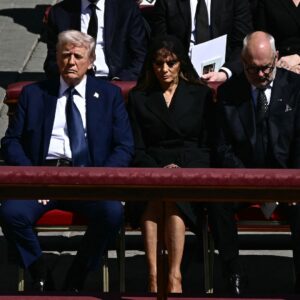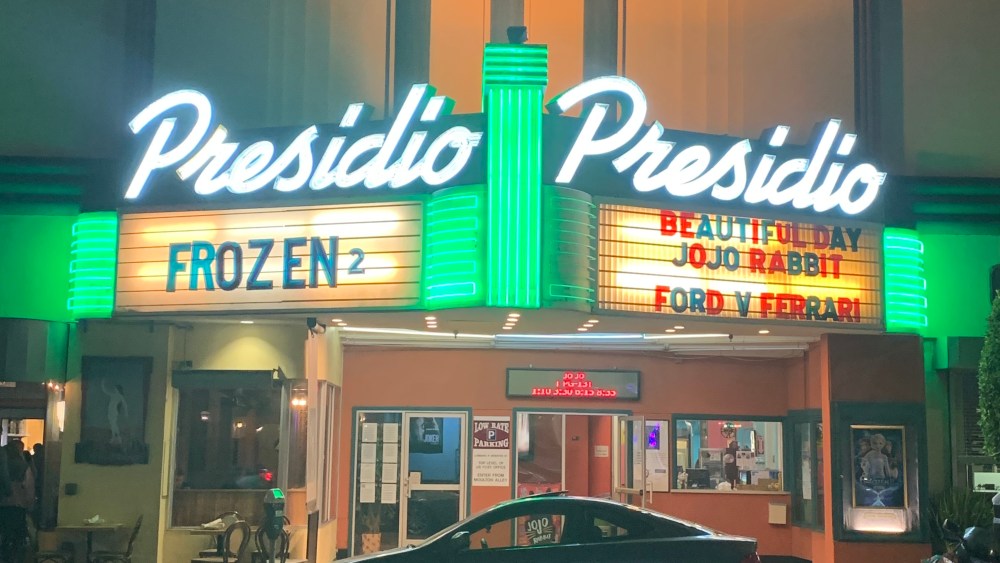Frank Lee has spent nearly his entire life running movie theaters. At 70, after a long career as an independent theater operator in San Francisco, he and his wife and co-owner, Lida, are looking to sell the Marina and Presidio theaters which they have overseen since the early 2000s. But he says the filmgoing experience shouldn’t end.
Lee wants to “see these two theaters continue as movie theaters.”
He says he would be sad about stepping away from the theaters, which are both on Chestnut Street in the Marina District and part of the Lee Neighborhood Theatres business, but that it’s the right moment for a new owner.
“I think it’s about time. After 60 years in the business, it might be a good opportunity right now. And things are looking up,” Lee told Variety. “I think the release schedule this year could be hopefully back to normal from pre-COVID.”
The lobby of the Marina theater in San Francisco.
Courtesy of Frank Lee
The Lees have operated the four-screen Presidio since 2004 and two-screen Marina since 2008.
“The neighborhood needs these two theaters, obviously,” Lee said.
Their first successful theater was the two-screen 4 Star Theatre in the Richmond District, which they ran from 1992 until they sold it in 2021.
The Lees would leave behind a wealth of community history at the theaters. They’ve already been part of curating film culture in San Francisco, particularly in the 1990s and early 2000s, when they programmed Asian cinema. They even held a dedicated Asian Film Festival at the 4 Star.
The festival would show films like Ang Lee’s “The Wedding Banquet,” Zhang Yimou’s “Raise the Red Lantern,” Park Chan-wook’s “Sympathy for Mr. Vengeance,” Bong Joon Ho’s “Barking Dogs Never Bite” and various works by filmmakers from Korea, Japan, Taiwan, the Philippines, Sri Lanka, Hong Kong and China. Takashi Miike attended the festival when it showed his film, “Dead or Alive.”
“We were showing some very good product out of all these Asian countries,” Lee said.
At that time, Lee was continuing on a practice he’d shared with his father, who worked to both distribute and screen Asian films from around 1964-1987. “I pretty much helped him, hand in hand, grew up with the business,” Lee said.
His father, Frank Lee Sr., had theaters across the U.S. and one in Toronto, largely serving the local Chinatown neighborhoods in their respective cities — “Wherever there was a Chinatown, he had a theater,” Lee said. His theaters included the Bella Union Theater in San Francisco; Cinema East and Europa (before it was the New Beverly) in Los Angeles; 55th St, Playhouse and Canal Cinema in New York and the College Theater in Toronto.
Frank Lee Sr. was operating these venues during a period when Chinese-language theaters were popular cultural hubs for Chinese immigrant communities. He was also part of the reason some Asian films even reached the U.S.
Lee, born and raised in San Francisco’s Chinatown, recalls attending the San Francisco International Film Festival as a 9-year-old, accompanying his father, Frank Lee Sr. They saw a film from Hong Kong studio Shaw Brothers. Frank Lee Sr., a civil engineer and radio producer, then got a three-year deal with the Shaw Brothers to distribute their films in the U.S.
Lee says that his father thought, “’How come nobody [is] exhibiting it?’ They were just exhibiting the old Hong Kong black-and-white films those days. The Shaw Brothers films were pretty much Hollywood, widescreen, color, really nice productions and everything else.”
The films were also an unconventional choice because they were in Mandarin, when Cantonese was more commonly spoken in the U.S. then, according to Lee. “He had a lot of support from New York media, San Francisco media and L.A. media, specifically newspapers of those days. They really supported the films, and they reviewed every film that he exhibited, that he brought over from Hong Kong,” Lee said.
Frank Lee Sr. started off with showing Hong Kong films then moved onto Taiwanese movies, before looping back to Hong Kong cinema. “There were about five or six distributors in this country that were fighting for the movies out of Hong Kong and Taiwan for 20 years. So my dad was one of the major ones,” Lee said.
“We [would] buy the rights to the films in Taiwan those days and distributed to as many as 50 screens back in the day, ’70s and early ’80s,” Lee added.

Courtesy of Frank Lee
Lee says his father closed his film business by the late ’80s, as home video became more widespread. During the pandemic, Lee sent film prints from his father’s operations back to film archives in Hong Kong and Taiwan. Lee’s own focus on programming Asian films ended after the 2000s as competition within that niche grew. But he’s proud of what he, and his father, accomplished: “I would say he’s a pioneer bringing in Asian films and introduce it to non-Asian audiences in the ’60s. Then I continued it in the early ’90s.”
These days, he and his wife show an array of films. Comedies and female audience-oriented films do particularly well, but the theaters also show a mix of commercial, Oscar-nominated and art films. The Lees rent the auditoriums out for private events like birthday parties, corporate events and Screen Actors Guild screenings. Local schools use the theater spaces for fundraising screenings. The San Francisco International Film Festival used both theaters this past April.

The exterior of the Marina theater in San Francisco.
Courtesy of Frank Lee
Lee says there isn’t much competition with other theaters. “On the west side, where we are, we are pretty much the only one, the only six-plex that exists right now,” he said. “We can pretty much book anything we like at the theaters being the only theaters in that area.”
He envisions that the Marina and Presidio can evolve to serve the city’s culinary tastes along with the theater experience. “We see an opportunity here where some operator might want to come in and do dine-in,” he said.
The Marina has been permit-approved by the city to install a food kitchen. While there is no application in the works for a similar permit at the Presidio, Lee said there is a general blueprint for adding dine-in elements to both theaters if a new owner wants to pursue that option, or even operating a ghost kitchen at one of the theaters to serve food to the other. Lee describes the Chestnut Street area as a “foodie area”: “Any new restaurant open, it’s phenomenal, it’s an event.”
The couple, who have two sons working as doctors, are aiming to retire this year and looking to talk to potential buyers.
As he and his wife prepare to let go of the Marina and Presidio, Lee foresees that their legacy as San Francisco theater operators will be about their contributions to the local film scene.
Their time in the theater business has included hurdles like the pandemic, as well as a legal fight in the 2000s to hold onto the 4 Star while facing eviction from the owners of the property. The Lees received community support, with thousands of people signing a petition to save the theater.
“A lot of people remember us that way — independent, hands-on, take a lot of chances at the fourth hour, pretty much show things that people don’t show,” he added.
Read the full article here








